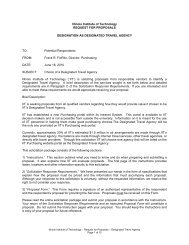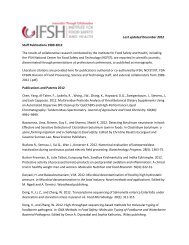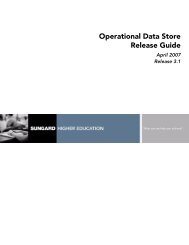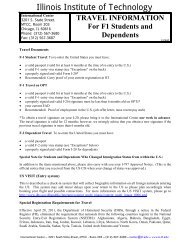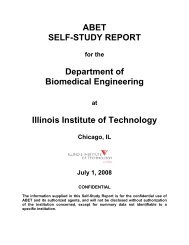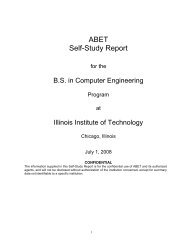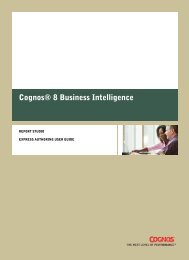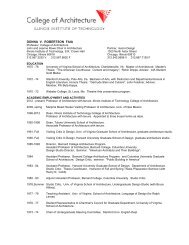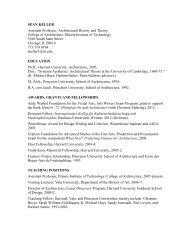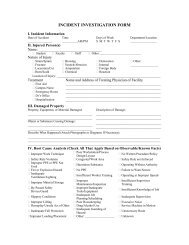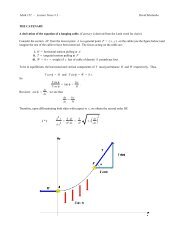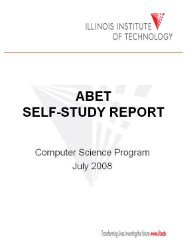Download entire Student Handbook - Illinois Institute of Technology
Download entire Student Handbook - Illinois Institute of Technology
Download entire Student Handbook - Illinois Institute of Technology
Create successful ePaper yourself
Turn your PDF publications into a flip-book with our unique Google optimized e-Paper software.
shall be closed. All reasonable measures will be taken to assure that no one involved in any complaint,<br />
investigation, or remedy shall suffer retaliation as a result <strong>of</strong> the proceedings.<br />
Except for informal complaints in which the complainant elects to take no action beyond consultation,<br />
all parties involved in the complaint shall be informed <strong>of</strong> the content and status <strong>of</strong> the complaint and<br />
shall be given the opportunity to respond. No actions shall be initiated without the consent <strong>of</strong> the<br />
complainant. However, the university must retain the right to conduct an investigation without the consent<br />
<strong>of</strong> the complainant if it determines that such investigation is necessary to protect the interests <strong>of</strong> the individuals<br />
or the university.<br />
4. Informal Consultation and Resolution<br />
Members <strong>of</strong> the university community who believe they have been subjected to sexual harassment as defined<br />
in this policy are encouraged to seek counsel, as appropriate, <strong>of</strong> faculty members, residence hall advisors,<br />
academic unit heads, deans, supervisors, department heads, or administrative <strong>of</strong>ficers <strong>of</strong> the university.<br />
The title IX coordinator, dean <strong>of</strong> students <strong>of</strong>fice, campus ombudsperson, human resources, and the<br />
counseling center are particularly appropriate.<br />
The person from whom counsel has been sought will review both the formal and informal options<br />
available, and will explain the differences between the two. At the complainant’s request, the person<br />
from whom counsel has been sought may help the complainant to resolve the matter informally.<br />
Should informal resolution not be possible, the person from whom counsel has been sought should assist<br />
in drafting a formal complaint or should refer the complainant to another member <strong>of</strong> the university<br />
community capable <strong>of</strong> providing this assistance. If the person from whom counsel is sought feels incapable<br />
<strong>of</strong> dealing with the matter, he or she should refer the complainant promptly to an appropriate person capable<br />
<strong>of</strong> assisting the complainant. The person alleged to have violated this policy will not be informed <strong>of</strong> the<br />
allegation without the consent <strong>of</strong> the complainant until and unless requested to assist in informal resolution<br />
<strong>of</strong> the allegation or a decision is made to submit a formal complaint.<br />
5. Investigation Prior to Formal Action<br />
Formal complaints should be filed with the Director <strong>of</strong> Equal Opportunity and Affirmative Action in the<br />
Office <strong>of</strong> General Counsel who will consult with the appropriate university administrators (including the<br />
title IX coordinator) to determine the method by which a preliminary investigation will be conducted.<br />
Investigations shall be conducted within the time frames prescribed by law and such time frame shall begin<br />
when a complaint is filed.<br />
The purpose <strong>of</strong> the preliminary investigation is to establish whether there is a reasonable basis for<br />
believing that a violation <strong>of</strong> this policy occurred. The preliminary investigation will afford the accused<br />
notice <strong>of</strong> the allegations and ample opportunity to respond. The investigator(s) shall interview the<br />
complainant, the accused, and any other persons believed to have pertinent factual knowledge, taking<br />
precautions to insure confidentiality throughout.<br />
At the close <strong>of</strong> the preliminary investigation, the investigator(s) shall prepare a summary statement <strong>of</strong><br />
findings. Possible outcomes include a judgment that the allegations are not founded; a negotiated<br />
settlement <strong>of</strong> the complaint; or a recommendation for formal action.<br />
Copies will be provided to the parties and to the Director <strong>of</strong> Equal Opportunity and Affirmative Action.<br />
6. Formal Action<br />
A formal investigation will go forward upon the recommendation <strong>of</strong> the Director <strong>of</strong> Equal Opportunity<br />
and Affirmative Action following the preliminary investigation or upon the request <strong>of</strong> the complainant or the<br />
accused at any time. The appropriate procedure for a formal proceeding depends on who is being<br />
accused <strong>of</strong> harassment.<br />
When the person accused <strong>of</strong> harassment is a student, the matter will be handled following the<br />
procedures for Conduct Discipline under the Code <strong>of</strong> Conduct in the <strong>Student</strong> <strong>Handbook</strong>. The complainant<br />
and accused shall have the right to appeal a sanction imposed by the Dean <strong>of</strong> <strong>Student</strong>s or Judicial Board<br />
in matters involving complaints <strong>of</strong> sexual harassment or sexual assault except when the sanction is<br />
suspension or expulsion and the basis for the appeal is that the sanction imposed is inappropriate to the<br />
<strong>of</strong>fense. Pursuant to the Code <strong>of</strong> Conduct, sanctions <strong>of</strong> suspension and expulsion are automatically<br />
stayed and referred to the Provost for review. The Provost may make any determination outlined in the



